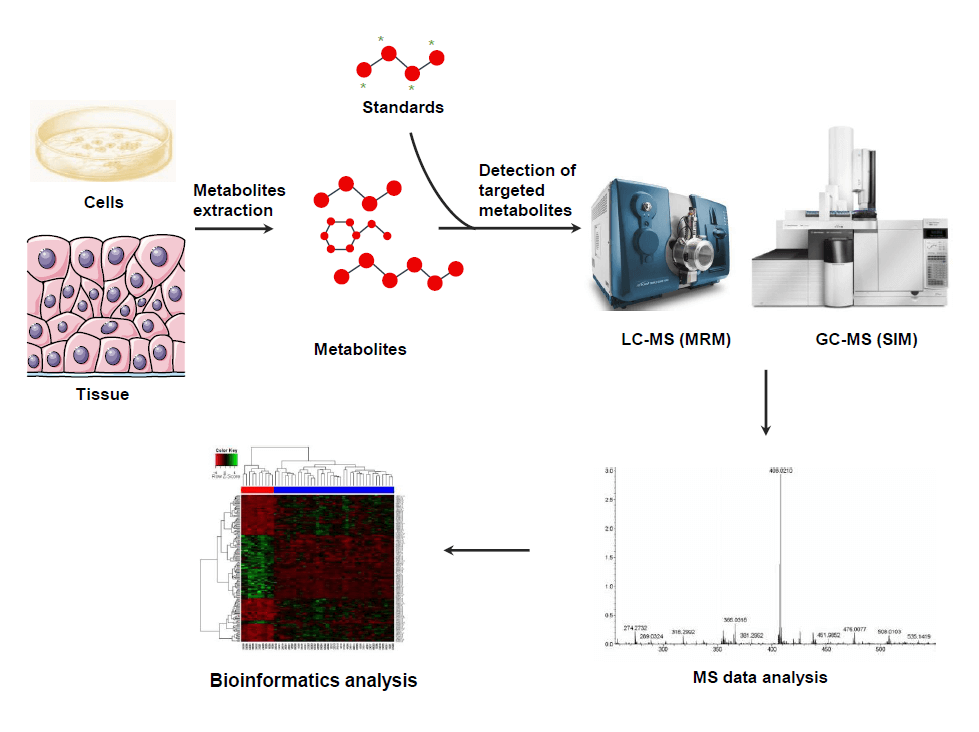Targeted Metabolomics Analysis Service
Targeted metabolomics is a study in which defined metabolites in a sample are identified and quantitatively analyzed. Quantitation and semi-quantitation of defined metabolites are undertaken through the use of internal standard compounds. Targeted metabolomics has an advantage of high specificity and accuracy. Thus, this method has been widely used to analyze and compare multiple targeted metabolites under different physiological states, and is a critical analytical method for discovery of new biomarker in metabolic diseases and study of early diagnosis of diseases.
MtoZ Biolabs offers targeted metabolomics analysis service using an LC-MS-based multiple reaction monitoring (MRM) and GC-MS-based single ion monitoring (SIM) metabolomics platforms, which have characteristics of high accuracy, specificity, and sensitivity. We guarantee accurate analysis of targeted metabolites, even in low abundance. With our optimized sample preparation methods, interference from high-abundance dominant metabolites can be hugely reduced, thus further increase the detecting sensitivity.
Analysis Workflow

List of Targeted Metabolites Analysis Services
|
Targeted Metabolomic Pathways |
|||||
|
NO. |
Pathway |
NO. |
Pathway |
NO. |
Pathway |
|
1 |
3 |
Lipid Metabolism (16) |
4 |
Glycan Biosynthesis and Metabolism (12) |
|
|
2 |
Tryptophan Pathway (30) |
|
|
|
|
|
Organic Compounds |
|||||
|
NO. |
Substance |
NO. |
Substance |
NO. |
Substance |
|
1 |
16 |
Energy Metabolism (83) |
31 |
||
|
2 |
Adenosine Phosphate (3) |
17 |
32 |
Plant Lectins (4) |
|
|
3 |
18 |
33 |
|||
|
4 |
Alkaloid (14) |
19 |
34 |
Purines (6) |
|
|
5 |
20 |
Glucosinolate (5) |
35 |
||
|
6 |
21 |
Lignans (4) |
36 |
Saponin (2) |
|
|
7 |
22 |
Indoxyl Sulfate and p-Cresol Sulfate (9) |
37 |
Stilbenes (3) |
|
|
8 |
23 |
38 |
Tannin (2) |
||
|
9 |
Branched-Chain Keto Acids (3) |
24 |
Neurotransmitters (78) |
39 |
Terpenoid (21) |
|
10 |
25 |
40 |
Toxin (4) |
||
|
11 |
Catecholamines (6) |
26 |
Nucleic Acid modification (71) |
41 |
|
|
12 |
27 |
Metabolic Flux (33) |
42 |
Trimethylamine Oxide (4) |
|
|
13 |
Ceramides (50) |
28 |
43 |
||
|
14 |
Chlorophyll (6) |
29 |
Oxidized Lipids (141) |
44 |
|
|
15 |
Coumarin (3) |
30 |
|
|
|
|
Inorganic Compounds |
|||||
|
NO. |
Substance |
NO. |
Substance |
NO. |
Substance |
|
1 |
Metal/Metallomics (69) |
|
|
|
|
Sample Submission Requirements
1. Cells and Microbes Samples: 1×10^7cells or 100 μL/sample. Cellular activities should be terminated instantly, whereas maintaining the cell integrity.
2. Animal Tissues: 100 mg/sample. Collect soft tissues like brain, heart, liver, muscle, and skin. Immediately add preservative reagent and freeze at -80°C.
3. Plant Tissues: 200 mg/sample. Samples should be frozen in liquid nitrogen right after sample collection, and then transferred to -80°C for storage.
4. Serum Samples: Repeated freezing and thawing of sample must be eliminated. Serum samples should be settled down at room temperature for 30 min in the collection tube, and then transferred to centrifuge tube and centrifuged at 8,000 rpm, 5 min. After centrifugation, supernatant is aliquoted to freezing tubes with 200 uL/sample, and stored at -80°C.
5. Urine Samples: 2mL/sample. Urine samples can be aliquoted to centrifuge tubes with 2mL each tube, with addition 1/100 (w/v) sodium azide, and stored at -80°C.
6. Faeces Samples: 200 mg/sample.
Deliverables
1. Experiment Procedures
2. Parameters of Liquid Chromatography and Mass Spectrometer
3. MS Raw Data Files
4. MS Data Quality Checks
5. Metabolites Quantification Data
6. Bioinformatics Analysis (PCA, KEGG, etc.)
Related Services
Metabolomics
Quantitative Proteomics
Protein Analysis
How to order?







